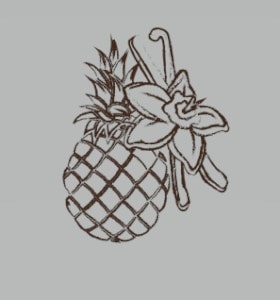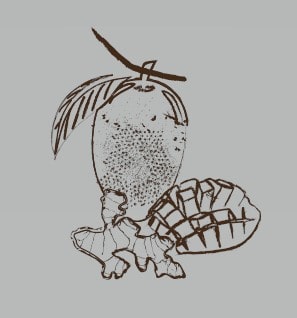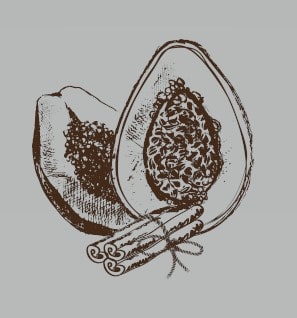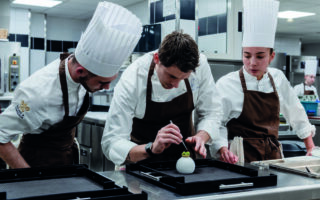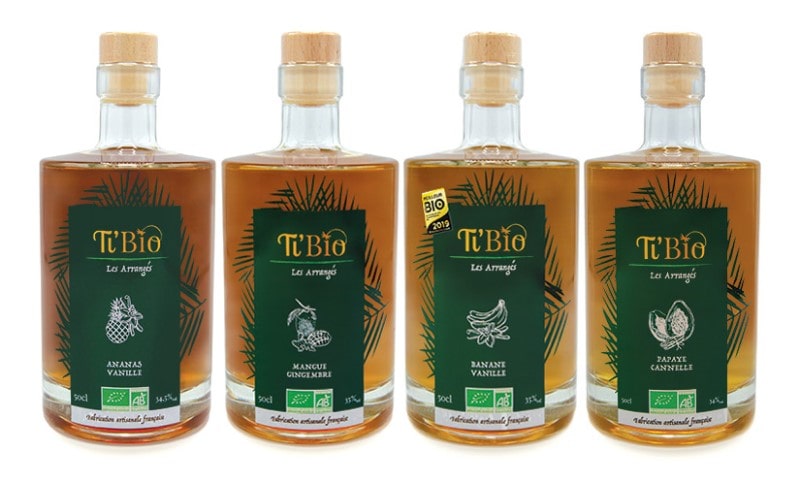
The big interview… Ti’Bio
Rhum arrangé is a speciality rum drink from Réunion that contains macerated fruit, seeds, spices, bark or natural sweeteners. We talk to master crafstman Xavier Ricci from producer Ti’Bio about the drink’s history and how to enjoy it
Can you give us an introductory guide to the history of arranged rum?
The history of arranged rum is a bit vague, but what often comes up is that it was invented on Reunion Island (France), in order to sell (and drink) rum that was… how can I say… often hard to drink. By adding fruits and spices, and sweetening it, the rum became more pleasant and found a “way out”.
Today, and this is my case, the making of an arranged rum is complex, especially when you want to make an exceptional, balanced product that is pleasant to taste, and not just a commercial success with a high margin.
Tell us about your own career path and how you became a producer of arranged rum.
My background is atypical… I have a technical university education (DUT in Chemistry with an environmental option), and for some time I worked alongside oenology laboratories. Then, after my military service, I finally decided to join the national gendarmerie where I worked as a non-commissioned officer for almost 10 years.
A professional opportunity allowed me to retrain as an archery teacher but an uncertain sporting future forced me to move into the private security profession. Finally, the idea of creating my own company became a reality at the end of my fixed-term contract, thanks to the existing support systems.
The origin of the company is twofold. First of all, it is a family story. My paternal grandmother was Mauritian who met my grandfather of Italian origin in Madagascar, where my father was born, and my aunts and uncles.
Then it was my family and friends who encouraged me to take the plunge. The natural added value was to start using organic, and if possible fair trade, raw materials to create high quality, top-of-the-range arranged rums.

What is Ti’Bio?
Big question! Ti’Bio – the brand being Ti’Bio Les Arrangés – was created in a very simple way: Ti means ‘small’ in Creole, and is very close to the famous ‘ti’punch’ that everyone knows. On the other hand, having chosen 100% organic, it was natural to find the Ti’Bio association and name! Finally, to be honest, what amused me is that Ti’Bio is very close to Ti Bo, which means a little kiss, celebrated by the famous traditional song by the Compagnie Créole, “Ba moin en tibo, deux ti bo trois ti bo doudou, etc…”.
Five main elements differentiate Ti’Bio arranged rums, which is the only French artisanal company entirely certified organic and offering 100% organic arranged rums from the fair trade sector.
- The decision to use 100% organic and fair trade ingredients for their incomparable taste qualities, and not only for their certification.
- No maceration in the bottles but in recycled glass bottles. This technique allows the products to be filtered and therefore to have no fruit residues. This helps with consistency of taste, as well as the preservation of flavours and aromas over the months.
- Another singular difference: the Ti’Bio arrangements are not “reduced”, i.e. they are not cut with water. This process implies that the degree of alcohol results exclusively from maceration and, when this is the case, from the addition of sugar to the recipe.
- The use of extra-fine cane sugar contributes to the aroma of the arrés (short for rhums arrangés), unlike leading brand manufacturers who use cane sugar syrup, which is equivalent to very sweet water.
- Finally, offering filtered arrés guarantees a net volume to be consumed per bottle, since 100% of the volume becomes drinkable.
How is it made?
Arranged rum can be made in different ways. For my part, I macerate my organic fruits and organic spices in recycled glass bottles and in organic rum, and not in plastic barrels, or directly in the bottle like most manufacturers.
The advantage is the guarantee of the taste and the absence of any deviation due to bad storage conditions, the degradation of the fruits or their oxidation. After maceration, I filter and let the maceration settle before sweetening it (except for the Brut range which has no added sugar, but with 20% more fruit in maceration). After this sweetening step, I filter again before bottling.
What flavours do you make?
Today, I have 12 different flavours:
- The organic fair trade range available in classic (sweet) and raw (no added sugar) with four flavours: pineapple and vanilla, mango and ginger, papaya and cinnamon and banana and vanilla.
- The organic range is composed of Ti’punch of Mémée Célérine (lime) and macadamia and vanilla.
- The blending range with blending n°1 (blending of the 4 classic arranged rums) and blending n°2 (blending of red fruits)
Which are the most popular?
There is one that stands out clearly, the Ti’Punch of Mémée Célérine! All the others are pretty much as popular as each other.
How should it Ti’Bio be served?
I recommend serving it very chilled (4-5°C) because that’s how I like it. But I know that some people drink it at room temperature. The association with an organic white beer from Will’s Brewery for example (with Mémée Célérine’s Ti’punch or the blend n°2) is very pleasant.
Many different cocktails are created by barmen or mixologists!
What are the elements of taste we should look for when we taste it?
The touch of spice that comes with the fruit – that is the star!
You believe in using organic and fair trade ingredients. What is your philosophy?
Yes, I do! It’s at the heart of my project and my company.
For me, this organic dimension is essential when you see the ravages of decades of intensive agriculture and its impact on health and the environment. Not forgetting those who do this organic farming also makes sense, because I know the difficult conditions and the low wages of producers exploited by unscrupulous multinationals. Fair trade and its guarantees allow for a rebalancing of power.
I always state that I do not wish to poison people with arranged rums made with fruit treated with phytosanitary and chemical products… not to mention the addition of artificial aromas, colourings and other disturbing agents. I found this philosophy again with one of my partners in the South West, Spiritism.
With which fruit producers do you partner with, and why?
I cannot reveal the partnership I have today with my main supplier of fair trade organic fruit, as you can understand.
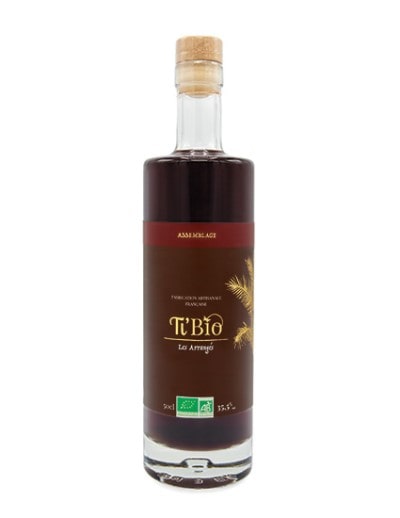
This is an African sector, featuring mainly two countries, Cameroon and Togo. For Macadamia nuts, I am in an organic fair trade supply chain from Kenya, while for citrus fruit, I have a partner at the MIN in Nantes and in the south-east of France.
Your arranged rums have been a success – tell us about some of the prizes you’ve won.
I don’t know if they’ve been successful, let’s just say they have been appreciated by various prize juries.
First came the international Top Rum competition in Paris, where I won a gold and a bronze medal in 2018-2019, respectively for my raw cinnamon and papaya and my Ti’punch from Mémée Célérine. In 2019-2020, I got three medals: gold, silver and bronze with the Ti’Punch de Mémée Célérine, the assembly n°2 and the raw vanilla and banana.
Then, I presented two flavours in 2019 and 2020 at the Best Organic Product competition in the alcohol category. The vanilla and banana won in 2019, and the mango and ginger in 2020. The year 2020 will also see our drinks recommended in Petit Futé, my inclusion in the Saveurs DététonNantes and my entry into the group of committed producers of the Maîtres-Restaurateurs.
Buy Ti Bio online here.
Share to: Facebook Twitter LinkedIn Email
More in Alcohol, Flavour, Interview, Partners, Tasting

